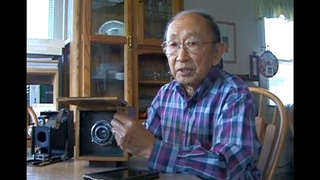Interviews
Too Ashamed to Tell
Many, many people mentioned it to me, and they said, "Gee, we didn't know what had happened to you," and you know, that's the thing. I have to tell you this. It's because when I first went to Chicago and to the University of Wisconsin, people would say, "Where are you from?" I never told them I was in camp. I was too ashamed to tell them that. And, but after this happened, of course, after the commission hearings, well, since everybody knew about it, then I was able to say, well, yeah, and describe to them what the situation was and what conditions we lived under and things like that. So it was... it kind of opened it all up for me.
I*: So you really changed a bit yourself during this whole process?
Oh, absolutely, absolutely. Yeah, it was a catharsis. Uh-huh.
*”I” indicates an interviewer (Becky Fukuda).
Date: September 11, 1997
Location: California, US
Interviewer: Becky Fukuda
Contributed by: Denshō: The Japanese American Legacy Project.
Explore More Videos

Neighbors' sympathy after Pearl Harbor
(1915 - 2011) Nisei florist who resettled in New York City after WW II. Active in Japanese American civil rights movement

No immediate impact after Pearl Harbor
(b. 1928) Doctor. Former Chair of the Japanese Canadian Redress Foundation.

Treatment of Japanese fishermen in Canada during World War II
(b. 1928) Doctor. Former Chair of the Japanese Canadian Redress Foundation.

Japanese newspaper supported by Canadian government during World War II
(b. 1928) Doctor. Former Chair of the Japanese Canadian Redress Foundation.


Life in camp as teenager
(1926 - 2012) Scholar and professor of anthropology. Leader in the establishment of ethnic studies as an academic discipline

Fun at concentration camp
Senshin Buddhist Temple minister and co-founder of Kinnara Taiko.

Hiding what happened in camp
(1922–2014) Political and civil rights activist.


Camp as a positive thing
(1922–2014) Political and civil rights activist.

His father describes the importance of photographing camp life
(1924-2016) Photographer and businessman.

Importance of education in achieving redress for incarceration
(1919-2014) Activist for civil rights and redress for World War II incarceration of Japanese Americans.


The birth of a novel through a conversation with her nephew
(b. 1934) Writer

